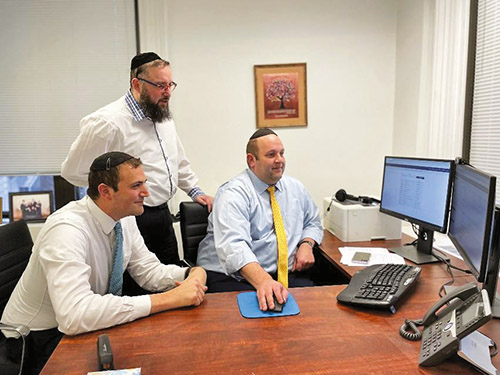
(Courtesy of OU Yachad) Miriam* was in disbelief when her 16-year-old daughter Tamar* was asked to leave her current school without being given any alternative options of where to turn.
Tamar, who has a developmental disability, was out of school for a month and was experiencing social isolation while her mother was urgently trying to find her a new school that would be a better fit. Miriam felt like she had no support and was becoming hopeless. The stress in the house was tremendous. It ultimately led her to make the phone call that would change everything.
At her wits’ end, Miriam contacted REACH, the resource and referral service founded by the Orthodox Union’s Yachad division. Yachad is dedicated to enriching the lives of Jewish individuals with disabilities and their families. It made all the difference for Miriam and her family.
REACH staff has handled more than 3,000 calls since 2021 to assist hundreds of families in New York since the service became available. Now it is expanding to include resources nationally, to help even more people discover crucial resources.
Callers speak with REACH staff, who listen to each family’s specific needs and create a curated list of options using a vast database. The database’s algorithm filters results according to precise needs such as age, disability, religious requirement, location and other essential criteria. The database includes schools; summer camps; medical professionals, including a variety of therapists; social activity resources; government services resources; and other miscellaneous services.
One of the REACH staff connected Miriam with an educational consultant who reviewed Tamar’s Individual Educational Plan and made targeted suggestions for schools that would welcome and empower her. Tamar was accepted to a school that seemed like a great fit for her, and she began soon after.
“REACH was really there for me every step of the way,” said Miriam. “The staff helped me in concrete ways. This was the best phone call I made for my daughter in her 16 years.”
Before REACH, there had never been a centralized location that provides guardians of children with disabilities with all the contact information they need. Yachad created the service to respond to decades of accumulated frustration by families jumping through hoops trying to help their loved ones.
“Our goal is to connect people with the right information,” said Michael Appelbaum, assistant director of communal engagement at Yachad. “We have created a database that is essentially a cheat code for families trying to find resources.”
It’s an arduous journey for families having trouble navigating the system, and REACH was created out of necessity.
“Disability affects everyone at some point in their life,” said Shira*, the mother of four kids diagnosed under that umbrella term. She stressed that families with disabilities—both visible and invisible—need more awareness, sensitivity and support from the Jewish community.
“It’s often a very silent pain that people are struggling with,” Shira said. “They really are in crisis. They don’t know who to call or where to turn, and it often feels like navigating a labyrinth,” she said. “Many kids are pushed out of the Jewish system due to the lack of resources.”
Shira stressed that while people generally understand that kids with visible disabilities should be embraced, that’s not always the outlook for children whose disabilities are not immediately apparent. “When they see a child who is alone and doesn’t want to talk to anybody, or who is acting out or having a meltdown, they often view this as a kid who is just out of control,” she said. “They don’t necessarily see that as a disability, they just see that as a behavior. ‘Invisible disabilities’ are not at all well understood.”
“Making a phone call is probably the bravest and best thing people can do because it gets the ball rolling. It’s a step forward,” Shira said. “Before REACH came on the scene, it seemed like if you have a child with a disability and you were struggling, you were alone, there was nobody to call. Now there is somebody to call.”
Contact REACH at 877-REACH-52
(877-732-2452).
*Names changed to maintain privacy













